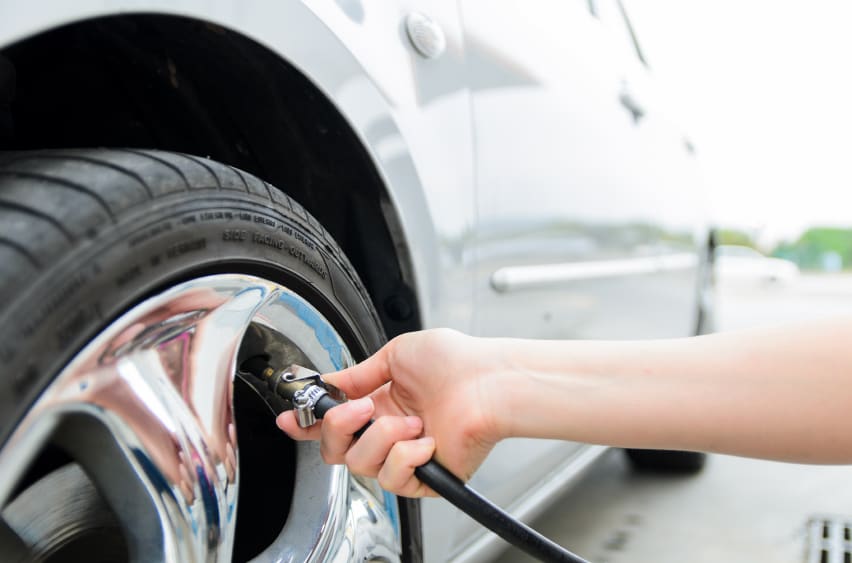

If you’ve had your tires replaced in the past two or three years, you might have been introduced to the nitrogen versus air in your tires debate. For years, commercial vehicle tires like airplanes and even high-performance race car tires have used nitrogen as their inflation gas of choice for multiple reasons. However, in recent years, consumer automotive professionals — especially tire manufacturers and aftermarket providers — have introduced nitrogen as a good choice for every-day drivers.
Is nitrogen really worth the extra effort and cost to inflate your tires with this fairly-inert gas? In the information below, we’ll discuss a few common consumer attributes that will determine which is better — regular air or nitrogen.
Cost & Convenience: Regular Air
While there are costs for new tires, air is typically not one of them — unless you choose the nitrogen alternative. Generally speaking, tire installation centers will charge a premium to inflate your tires with nitrogen instead of regular air. If nitrogen is offered at your local tire installation or service center, you will likely be charged anywhere from $5 to $8 per tire if they are inflated during the installation. For those considering swapping from regular air to pure nitrogen (at least 95% pure) some tire installation locations will charge anywhere from $50 to $150 for a full nitrogen upgrade.
This might inspire the question: why does it cost more to replace air with nitrogen versus using it from the start? Well, some tire experts consider it to be ‘more work’ to break the bead of a current tire, making sure all ‘air’ has been removed, then seating the tire bead to the rim with fresh nitrogen. It’s also a bit risky to ‘bust’ the tire without causing damage. Additionally, nitrogen is not available at all tire locations, so for the sake of convenience, using regular air is the big winner.
Keeping Tire Pressure Consistent: Nitrogen
Every tire made is not entirely solid. Rubber has several microscopic holes or pores that permit air to seep out over longer periods of time. This will gradually inflate or reduce tire pressure based on temperature and other conditions. A general rule of thumb is for every 10 degrees in temperature change, tires will drop or expand 1 pound per square inch or PSI. Nitrogen is comprised of larger molecules than regular air, making it less susceptible to losing air pressure.
To prove this fact, a recent study completed by Consumer Reports compared tires filled with nitrogen to those with regular air. In this study, they used 31 different tires and filled one with nitrogen and the other with regular air. They left each tire outdoors in the same conditions over a period of a calendar year and found that tires with regular air lost 3.5 pounds (on the average) with nitrogen only losing 2.2 pounds.
Fuel Economy: No Difference
Although many tire shops might tell you nitrogen-filled tires maintain better fuel economy than regular air, there simply isn’t any evidence to support this claim. According to the EPA, the major contributing factor to reduced fuel economy with tires is air pressure. As noted above, nitrogen offers a slight advantage in that category. The EPA-estimates claim that fuel mileage will drop 0.3 percent per pound of inflation in all four tires. As long as you’re being proactive about checking your tires for proper inflation on a monthly basis as recommended, the changes in fuel economy will not be significant.
Tire Aging and Wheel Corrosion: Nitrogen
Contrary to popular belief, the normal air we breathe is not only oxygen. In fact, it’s actually 21 percent oxygen, 78 percent nitrogen, and 1 percent other gases. Oxygen is known for its ability to retain moisture and does so inside the tire/wheel when it’s installed as compressed air. Over time, this excessive moisture can cause the inner tire casing to corrode — leading to premature aging, damage to steel belts, and even promotes the development of rust for steel wheels. Nitrogen, on the other hand, is a dry, inert gas that does not bind to moisture well. For this reason, tire shops use nitrogen that is at least 93 to 95 percent pure. Since moisture inside the tire is the leading source of premature damage to tires, dry nitrogen holds the advantage in this category.
When you look at the big picture in the nitrogen versus air in tires debate, each offers consumers unique advantages. If you don’t mind paying the premium cost, using nitrogen inflation is a good idea (especially for those living in colder climates). However, as of now, there is not enough evidence to support rushing to your local tire store for a nitrogen swap over.



